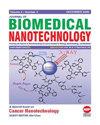Effects of Circ_0132269 on the Progression of Hepatocellular Carcinoma via Targeting miR-1248/MTO1
IF 2.9
4区 医学
Q1 Medicine
引用次数: 0
Abstract
We investigated the role of circ_0132269 in hepatocellular carcinoma (HCC). We examined circ_0132269 levels in HCC tissues and cell lines using qRT-PCR. Survival analysis was performed to assess the correlation between circ_0132269 expression and HCC patient survival rates. Knockdown of circ_0132269 was performed to evaluate its impact on HCC cell proliferation, migration, and invasion. Bioinformatics analysis predicted that circ_0132269 could interact with miR-1248. This interaction was confirmed using dual luciferase assays, and the correlation between circ_0132269 and miR-1248 was analyzed. Further functional experiments investigated the effect of miR-1248 on circ_0132269-mediated malignant phenotypes. circ_0132269 was significantly upregulated in HCC tissues and cell lines. Higher circ_0132269 expression correlated with poorer overall and disease-free survival in HCC patients. Silencing circ_0132269 suppressed HCC cell proliferation, migration, and invasion. Bioinformatics analysis revealed a binding site between circ_0132269 and miR-1248. miR-1248 expression was reduced in HCC, while its target MTO1 was highly expressed. miR-1248 levels showed a negative correlation with circ_0132269 and MTO1 levels, while circ_0132269 and MTO1 exhibited a positive correlation. Overexpression of miR-1248 partially reversed the promotive effect of highly expressed circ_0132269 on HCC cell behaviors. circ_0132269 was significantly upregulated in HCC and associated with poor prognosis. It interacts with miR-1248 to regulate HCC malignancy, highlighting its potential as a diagnostic and therapeutic target.Circ_0132269 通过靶向 miR-1248/MTO1 对肝细胞癌进展的影响
我们研究了circ_0132269在肝细胞癌(HCC)中的作用。我们使用qRT-PCR检测了HCC组织和细胞系中circ_0132269的水平。通过生存分析评估circ_0132269表达与HCC患者生存率的相关性。通过敲低circ_0132269来评估其对HCC细胞增殖、迁移和侵袭的影响。生物信息学分析预测circ_0132269可以与miR-1248相互作用。双荧光素酶测定证实了这种相互作用,并分析了circ_0132269和miR-1248之间的相关性。进一步的功能实验研究了miR-1248对circ_0132269介导的恶性表型的影响。circ_0132269在HCC组织和细胞系中显著上调。较高的circ_0132269表达与HCC患者较差的总生存期和无病生存期相关。沉默circ_0132269抑制HCC细胞的增殖、迁移和侵袭。生物信息学分析显示circ_0132269与miR-1248之间存在一个结合位点。miR-1248在HCC中表达降低,而其靶细胞MTO1高表达。miR-1248水平与circ_0132269和MTO1水平呈负相关,而circ_0132269与MTO1呈正相关。过表达miR-1248部分逆转了高表达circ_0132269对HCC细胞行为的促进作用。circ_0132269在HCC中显著上调,并与不良预后相关。它与miR-1248相互作用调节HCC恶性肿瘤,突出其作为诊断和治疗靶点的潜力。
本文章由计算机程序翻译,如有差异,请以英文原文为准。
求助全文
约1分钟内获得全文
求助全文
来源期刊
CiteScore
4.30
自引率
17.20%
发文量
145
审稿时长
2.3 months
期刊介绍:
Information not localized

 求助内容:
求助内容: 应助结果提醒方式:
应助结果提醒方式:


